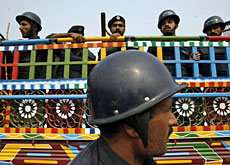
Government puts arms exports to Pakistan on hold

The Swiss government has decided to suspend temporarily export licences for anti-air defence systems destined for Pakistan.
A cabinet statement on Wednesday said the move was being made because of the current political situation in the country.
In September a group on the political left, judging the law on exports was not restrictive enough, handed in a people’s initiative calling for a total ban.
For the third time in less than a year the government had been asked to change its decision to authorise the Swiss firm Oerlikon Contraves to sell the Pakistani army 21 Skyguard anti-aircraft defence batteries valued at SFr136 million ($120 million). Six have already been delivered.
Swiss law bans the sale of war materiel to crisis regions.
Neither Oerlikon Contraves, nor its German parent company Rheinmetall would comment on the government decision Wednesday.
President General Pervez Musharraf has been accused of effectively imposing martial law when he declared emergency rule on November 3 – suspending citizens’ rights and rounding up thousands of his opponents. Musharraf said the restrictions were needed to bolster the fight against the Taliban and al-Qaeda militant groups.
It is for this reason that Green parliamentarian Josef Lang and others on the left called on the government to halt its export of military supplies to Pakistan.
“Article 22 of the law on war materiel states that export is authorised if it does not contravene international law, Swiss foreign policy or its international obligations,” said Joël Lanfranconi from the State Secretariat for Economic Affairs (Seco).
Seco is responsible, on behalf of the foreign ministry, for evaluating the export of arms.
This general principle is complemented by a series of criteria, as listed under article 5 of the law on war materiel, such as “the maintaining of peace and international security, the domestic situation in the destination country and its respect of human rights and attitude towards the international community”.
Subjective
Lanfranconi admits that the way in which one weighs up the various criteria could result in different interpretations.
Andreas Gross, a parliamentarian from the centre-left Social Democratic Party and founder of the Group for a Switzerland without an Army that wants a total ban on arms exports, says the decision to authorise the sale to Pakistan is above all political and not only technical.
Gross says the current law provides for avoiding the sale of arms to crisis regions as long as one respects the spirit and not the letter of the law.
This however is not always the case, admitted leftwing figures who recently criticised the government for selling arms not only to Pakistan but also to Saudi Arabia.
Keeping competitive
Gross adds that Swiss companies involved in weapons dealing, whose survival is one of the objectives of the law on war materiel, should change their business strategy and abandon this market.
“The Swiss economy cannot compete with countries including China, France or the United States. The market is totally rigged.”
Unsurprisingly the businesses involved disagree. “Most companies active in this sector are subcontractors that do not deal exclusively with arms,” said Giovanni Giunta, head of a defence and security supplies group in French-speaking Switzerland.
“It is often in defence and security that research is the most specialised. In keeping in touch with this market, our companies remain competitive in other sectors too.”
swissinfo
In 2006, Switzerland exported military equipment to 62 countries worth SFr397.6 million (SFr258.7 million in 2005). This represents 0.21% of the country’s total exports.
The increase came mainly from the delivery of around 60 armoured troop transport vehicles and eight reconnaissance vehicles worth SFr92 million to the Danish armed forces, and the sale of another 24 armoured vehicles (SFr20 million) to Chile.
If all Swiss components exported for weapons systems were taken into consideration, the total reaches SFr1.6 billion.
All weapons sales, including those to the Swiss army, push the figure to SF3 billion.
In 2006, the government granted the following export licences:
106 assault rifles for the Saudi navy
20 air-defence systems for the Saudi defence ministry.
21 air-defence systems for Pakistan
140 rifles for India’s national guard
In the past, the government has prevented some exports, for example the sale of Pilatus aircraft to Mexico in 1995.
It has also suspended exports, as it did in 1998 after nuclear tests by India and Pakistan. This ban was lifted in 2005.

In compliance with the JTI standards
More: SWI swissinfo.ch certified by the Journalism Trust Initiative


























You can find an overview of ongoing debates with our journalists here . Please join us!
If you want to start a conversation about a topic raised in this article or want to report factual errors, email us at english@swissinfo.ch.